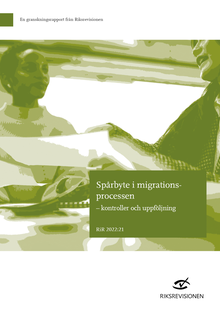Deficiencies in the system of changing tracks in the migration process
The system of changing tracks in the migration process contains deficiencies in terms of controls and follow-up. This means there is a risk that sham employment and misuse go undetected, and that vulnerable people are exploited by unscrupulous employers.

Photo: Caiaimage
‘Changing tracks’ is when a person who has had their asylum application rejected may have the possibility to seek a residence permit for work without first having to leave the country. The requirement is that the applicant must have started entering the Swedish labour market.
The Swedish National Audit Office audit shows that most track changers have wages that meet the requirements and have started establishing themselves in Sweden. At the same time, the Swedish National Audit Office considers that a track change can be used to circumvent legislation on asylum and labour immigration, with the aim of entering the Swedish labour market.
The main reason is the opportunity that the system provides to work both during the asylum process and later during the processing of the application for changing tracks, without the checks that otherwise apply for labour immigration. This thus increases the risk of unscrupulous employers exploiting vulnerable people who want to work in Sweden.
There are several indications that changing tracks is misused. The audit shows, for example, that 7 per cent of track changers did not have any, or very little, registered income during the four months prior to their application for a track change. These people therefore did not meet the maintenance requirement for a work permit.
Furthermore, 6 per cent of the track changers did not have any, or very little, income in the year following the track change. This also suggests that the conditions for a work permit were not met at the time of application, or that the employment on which the permit was based was terminated in advance.
It can be difficult for the Swedish Migration Agency to detect misuse and sham employment, for example if applicants and employers deliberately submit misleading information. The Swedish Migration Agency’s checks are also made more difficult by the fact that the agency lacks a technical solution for collecting information from the Swedish Tax Agency for persons who have a coordination number, which applies to most of the track changers. In recent years, the Swedish Migration Agency has also not carried out follow-up checks, due to inadequate resources.
“These shortcomings make it possible to enter the Swedish labour market on incorrect grounds. In addition, vulnerable people may be exploited by employers who offer lower wages and working conditions than is customary in the Swedish labour market,” says Tina Malmberg, Project Leader for the audit.
The Swedish National Audit Office further notes that the system of changing tracks has not been followed up, despite several referral bodies pointing out the risks of misuse and side effects.
“The Government should have followed up whether the system functions as intended and is not used wrongly,” says Auditor General Helena Lindberg.
The Swedish National Audit Office’s recommendations in brief
To the Government:
- Ensure that the Swedish Migration Agency can share necessary information with collaborating agencies, and that the information can be used in the processing of cases.
- Ensure that the Swedish Migration Agency can compile necessary information about employers to investigate and check track changing cases.
To the Swedish Migration Agency:
- Give priority to and strengthen efforts concerning follow-up checks of granted track changes, both automated and risk-based manual checks.
- Investigate the possibilities of automating checks concerning whether the conditions for track changes are met.
- Develop a technical solution to collect information from the Swedish Tax Agency, also for people who have a coordination number.
See the report for full recommendations.
Press contact: Olle Castelius, phone: +46 8-5171 40 04.
Presskontakt: Olle Castelius , telefon: 08-5171 42 06.
Share in social media and by e-mail
Contact form
Send your questions or comments via the form below and we will make sure that they reach the right member of staff. Please state if your question concerns the information on this particular page.


